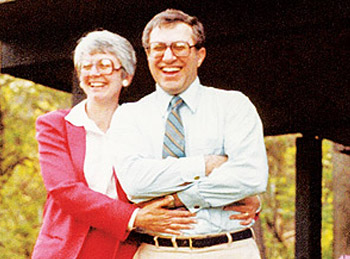Our Stories
Patients & Families: Ersen Arseven
Patients & Families: Ersen Arseven

Why did you choose Calvary Hospital?
I wanted to take care of my wife at home. My primary concern was that if she fell down and got hurt, I would never be able to forgive myself. When I spoke with local hospice in Rockland County (that was just being established back then), they told me that they could do things to alleviate her pain if she falls and gets hurt, but they could not do much more than that. They suggested that I take her to Calvary Hospital to make her comfortable.
How did you meet your wife Susan?
I met my wife at the University of Pennsylvania in 1967 at a Halloween party. I used to run into her at times at the University Science Center as well. She led the University of Pennsylvania team that delivered the first automated circulation control and serials/periodicals catalog system in any major university library. I was a first-year graduate student from Turkey.
I received my master’s degree from the University of Pennsylvania in 1969 and went to Texas A&M to get my Ph.D. We got married in 1970; she also transferred to Texas A&M. She received her Ph.D. in Computer Science from Texas A&M in 1975. We moved to New York to work at the Medical Research Division of American Cyanamid located at The Lederle Laboratories. We started working in the pharmaceutical industry in January 1975, right after we moved to New York.
When she was working for American Cyanamid’s Medical Research Division, she completed the Executive MBA Program at Columbia University in 1981. She was extremely smart, but she was the most humble person I ever met.
What was your wife most passionate about?
She fought fiercely for women’s equality. She was a wise and generous mentor to many people. She was also a dynamic force in advocating for women’s leading roles in business.
Susan worked at American Cyanamid for 20 years. She started as a systems analyst with the Medical Research Division in 1975 and then became director of information services for the Agricultural Group in 1981. When Cyanamid was bought by American Home Products, she was offered a job at Union Camp Corporation. In her new job, she served as Senior Vice President and Chief Information Officer of Union Camp Corporation until May of 1999, when the company was bought by International Paper. She traveled a lot for business.
When did Susan get sick?
In 1988 or ’89, she was diagnosed with breast cancer. She went for her yearly exam and they said she was good. Six months later, we discovered that she had stage 3 breast cancer. Susan opted for breast surgery and she fought the disease the whole time. I resigned from my position at Boehringer-Ingelheim Pharmaceuticals in 1990 and devoted my time to help care for her. I still consulted, but my primary focus was to take care of her and arrange her medical care. Susan continued to work, and we got used to overcoming the problems. We had a wonderful life together.
In 2000, Susan’s mother was visiting us at the time. When I came home one day, my mother-in-law told me that Susan was having problems remembering and she thought Susan had chemo brain (mental cloudiness or changes that can occur during, and after cancer treatment). We discovered that her brain was damaged because of the antibiotics that she was taking for a year. It destroyed the gray matter in her brain. There was nothing that could be done, and I did not know what to do.
When did she get admitted to Calvary?
Our oncologist recommended Calvary Hospital. The evaluation team came and she was admitted to Calvary on July 13, 2000. She stayed at Calvary for eight days on the third floor. One of the most memorable moments at Calvary was when I was talking to the admitting people on the first day and I said, “Pretty soon, it’s going to be our 30th wedding anniversary and I want to bring champagne to celebrate with my wife.” They said without hesitation that they would take care of the champagne and celebration, and they did.
Susan died three days after our 30th anniversary. Calvary called me and said that she was critical and actively dying. I rushed to the hospital and she died in my presence at 5:05 pm. Susan still had her wedding ring on her finger and they took time to take the ring with the utmost care and give it to me. They were extremely thoughtful.
My experience with Calvary was special. I spent night and day at Calvary during the time of Susan’s care. I remember they allowed the little kids to visit their grandparents that were near death. It was an unbelievably beautiful peaceful coexistence of life and death.
I have become an American citizen since I came to this country, and I have a sister still in Turkey. Dying with dignity in America is very difficult. Everyone should die with dignity and Calvary is one of those places where patients are allowed to die with dignity.
I still visit Calvary Hospital every year on July 21 for the anniversary of my wife’s death to view the leaf that was placed in her memory on the Tree of Life.
What was your wife’s moral legacy?
I learned from my wife to accept things as they come. She never asked, “Why did this happen to me?” She only asked me once if she was dying. She was very modest and felt it was important to help people without expecting anything in return. She was also a staunch supporter of women’s equality.
One of the reasons we got married is because we both agreed that two people can never be happy together if the two people are not happy as individuals.
Ersen Arseven